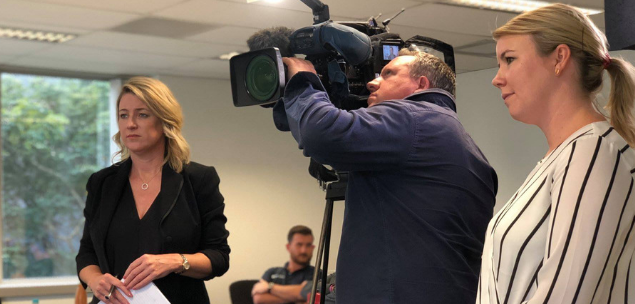Byline: Leisa Goddard, Managing Director of Adoni Media
With the explosion of social media and the insatiable 24-hour news cycle, it’s more important than ever for business leaders to have the confidence and skills to make the most of every media opportunity.
Too many business owners and C-suite executives don’t know what to do if a journalist calls and by default miss out on positive media exposure or do their brand damage by saying “no comment” in a crisis situation.
As a journalist who has worked across Australian TV for nearly 30 years I know from first-hand experience that you often only get once chance to get it right. I also know that a lot of the time mistakes happen because companies and spokespeople are not prepared with the right key messages or have the confidence to deliver them.
It can take a lot of courage to stand up in front of a TV news camera or do a live radio interview, especially if you haven’t been trained.
As Managing Director of Adoni Media, a national public relations and digital agency, we use our experience as working journalists combined with years of experience as media trainers to teach the presentation skills and messaging techniques people need to feel confident.
Department of Employment figures show by 2020 the number of journalists and writers in this country is expected to increase to 30,300 with new technologies introducing new publications and growing audience reach. For business that means more opportunity to be heard.
Here are a few of my tips on why media training is so important if you want to stand out from your competitor and build brand authority.
Don’t let media opportunities go to competitors
In a world where newsrooms are downsizing and demand for content is increasing journalists are very time poor. It means if you’re unable to respond to their media enquiry quickly, it’s likely they will move on to your competitor.
Business leaders need to be readily available for potential media opportunities, which may include being able to answer difficult questions or comment on wider industry issues.
According to the recent Startup Muster report, 42 per cent of the 3,476 Australian start-up founders surveyed, said their ventures needed media exposure in the next six months – highlighting the importance of taking every media opportunity presented.
Proactive and reactive media
Media training is about being prepared so that you’re ready and confident to respond to proactive media opportunities as well as manage reactive media.
Too often media attention comes at the least opportune time, and regrettably, it’s often because of unwelcome news. Stories surrounding job cuts, accidents, scandals and controversy are all issues which can have the media at your door.
In these instances, it’s crucial that your spokesperson can successfully protect your reputation. Unfortunately, more often than not, it’s only once the media is circling that companies realise how unprepared they are.
Delivering key messages
‘What are you going to ask?’ is the most common question from people who are about to be interviewed, when realistically, the journalist will rarely reveal their list of questions.
What’s important is to be able to acknowledge the journalist’s question and then skilfully redirect back to the message you want the audience to hear. Bridging techniques such as “what I can tell you” can be a lifeline particularly when confronted with difficult questions.
The other must-have skill is being able to develop key messages that will engage your target audience.
Utilising media training to improve other business skills
Media training improves your overall presentation skills including body language, finding your natural voice and overcoming nerves. Feedback from executives and spokespeople who complete media training overwhelming shows they leave feeling far more confident both in their media skills and public speaking.
Leisa Goddard is the Managing Director of Digital and PR Agency Adoni Media. Leisa has more than 25 years of experience working and presenting news and current affairs for Australia’s three commercial television networks including as a foreign correspondent and war correspondent. Her award-winning agency has offices in Sydney and Brisbane.

